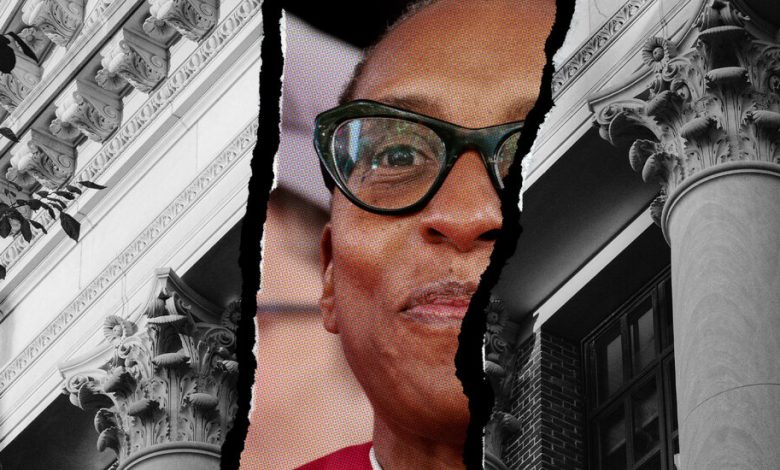The Persecution of Harvard’s Claudine Gay

Claudine Gay, the president of Harvard who announced her resignation on Tuesday after her problematic congressional testimony about antisemitism and mounting questions about missing citations and quotation marks in her published work, was, in part, pushed out by political forces beyond academia and hostile to it.
But the campaign against her was never truly about her testimony or accusations of plagiarism.
It was a political attack on a symbol. It was a campaign of abrogation. It was and is a project of displacement and defilement meant to reverse progress and shame the proponents of that progress.
As Janai Nelson, the president of the NAACP Legal Defense and Educational Fund Inc., posted online, “The project isn’t to thwart hate but to foment it thru vicious takedowns.”
When Gay and the presidents of M.I.T. and the University of Pennsylvania botched their responses before Congress, some on the political right sensed a weakness, and it quickened them. This was their chance not only to burn a witch but to torch a coven.
The presidents’ failure to provide clear, simple answers to questions whose answers would seem obvious — opting instead for halting, overlawyered responses — was pilloried as a symptom of a disease, the descent of liberalism into a form of cultural insanity driven by an obsession with identities and protection of the perverse.
When Bill Ackman, a billionaire investor and Harvard alumnus, published a Nov. 4 letter to then-President Gay, a month before the congressional testimony, he gave away the game with a swipe at Harvard’s Office for Equity, Diversity, Inclusion and Belonging, complaining that it “does not support Jewish, Asian and non-L.G.B.T.Q.I.A. white students.”
Diversity, equity and inclusion, or D.E.I. — the effort to assist and support the underrepresented — turns out to be the ultimate target.
And to underscore that the vilification of the college presidents was about something more than their remarks about antisemitism, just two weeks after Ackman published his letter, he defended Elon Musk, saying that the controversial electric car maker “is not an antisemite,” even after Musk replied approvingly, on his social media platform, X, to the statement that Jewish communities “have been pushing the exact kind of dialectical hatred against whites that they claim to want people to stop using against them.”
When I spoke with the U.C.L.A. Law and Columbia Law School professor Kimberlé Crenshaw last year about the battle in Florida over the teaching of Black history, she warned that this scapegoating of academics would spread to D.E.I. efforts beyond academia, including in corporate America. “This thing will not be satisfied by one victory,” she said. “This is just one skirmish in a wider, broader battle” to make discussions about the legacy of racism in this country taboo and “to contain the power of Black folks, queer folks, women and pretty much everybody else who doesn’t agree to the agenda of reclaiming this country that the MAGA group claims.”
At the time, I didn’t fully appreciate just how prescient her words were.
When the plagiarism allegations against Gay arose, the campaign against her went from being something survivable into something that wasn’t. Her problems could now be labeled multifactorial, her appointment fundamentally flawed — misguided cultural elites had bent the puzzle to make the piece fit, and now it was coming undone.
Conservatives would be the sun to Gay’s Icarus, demonstrating just how hot they could make things for her.
At a time when Black women are ascendant in the culture, they have become, for some, the emblems of unwelcome change; their presence in positions of power represents a threat to the power traditionally clustered in the hands of a few.
As such, Black women see their credentials relentlessly attacked, their characters impugned, their lives scoured. The issue is not that the bar is lowered for them to succeed but rather raised so that any imperfection can be inflated into a fundamental flaw. These women are trapped in prisons of others’ demands for perfection.
Call it the Wonder Woman requirement.
And these attacks are unceasing: In 2020, President Donald Trump amplified the racist theory that then-Senator Kamala Harris wasn’t eligible for the vice presidency because her parents were immigrants. She was born in California.
Trump also used the racist conspiracy theory that Barack Obama was not a natural-born American citizen to begin his foray into presidential politics.
On the day that President Biden nominated Ketanji Brown Jackson to serve on the Supreme Court, Kevin Roberts, the president of the Heritage Foundation, called her a “radical judge” and said that the Senate should reject her because “her limited judicial record” revealed that she “consistently ignored the Constitution.” Now a think tank run by a former Trump administration official has called for an ethics investigation into the source of her husband’s income and funding for an event held to mark her swearing-in.
Where is that energy when it comes to Clarence Thomas’s multifarious ethical issues?
The Democratic governor of California, Gavin Newsom, committed to appointing a Black woman to the Senate if Dianne Feinstein’s seat became vacant. After she died, one headline from the far-right publication The Federalist blared, “Dianne Feinstein’s Senate Replacement Will Be Defined by the Racist, Sexist Criteria She Fits.”
Even private attempts to lift Black women are under attack: Edward Blum, the man behind the case against Harvard and the University of North Carolina that led to the end of affirmative action in college admissions, filed a lawsuit last year against an Atlanta venture capital fund that gave grants to businesses owned by Black women. The suit claims that the grants violate the Civil Rights Act of 1866.
As Black women have raised their profiles, they’ve raised some right-wing hackles, making them targets of political aggression. And unfortunately, Gay’s resignation will be like blood that further chums the water. As Crenshaw put it, this thing will not be satisfied.
Source photographs by Tristan Spinski for The New York Times and The Boston Globe, via Getty Images.
The Times is committed to publishing a diversity of letters to the editor. We’d like to hear what you think about this or any of our articles. Here are some tips. And here’s our email: [email protected].
Follow the New York Times Opinion section on Facebook, Instagram, TikTok, X and Threads.





